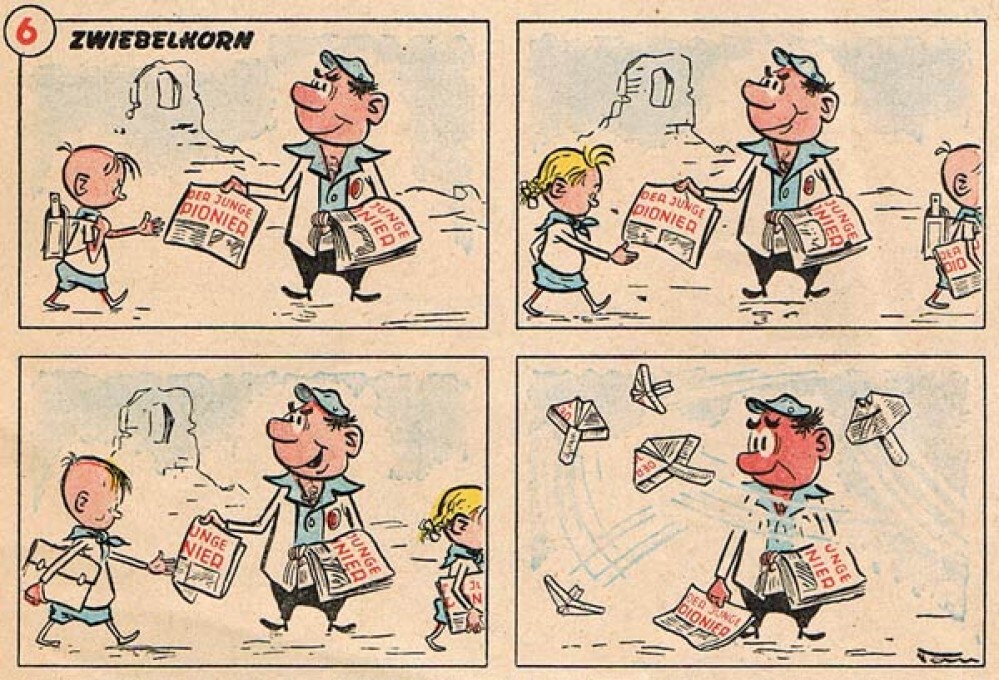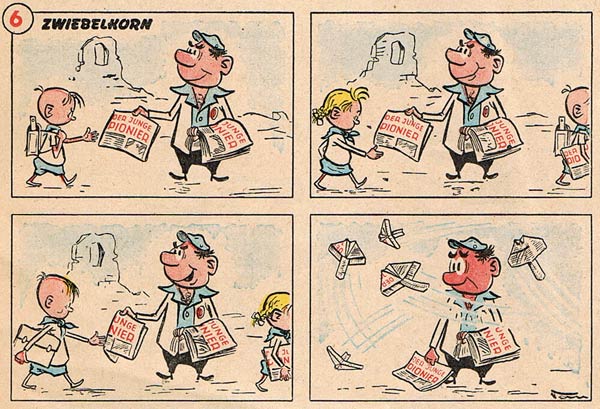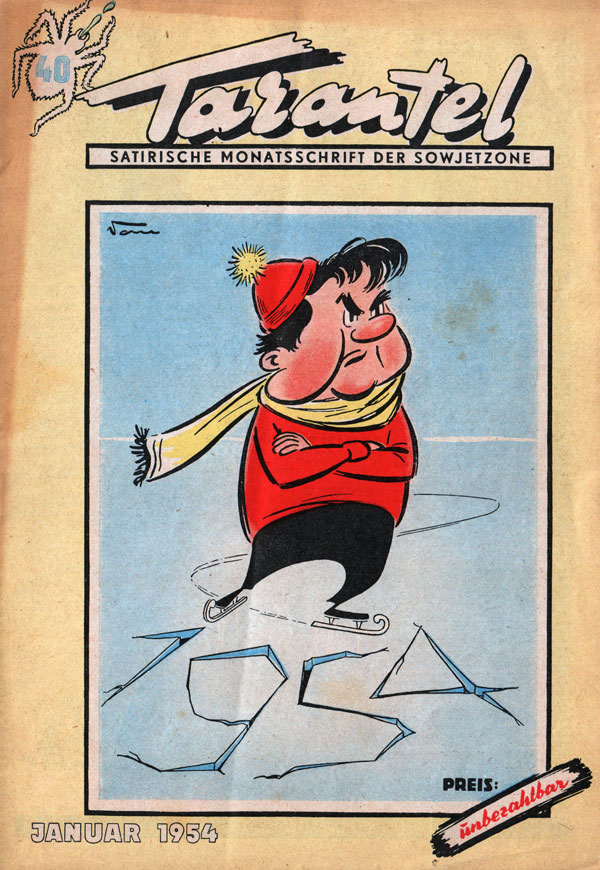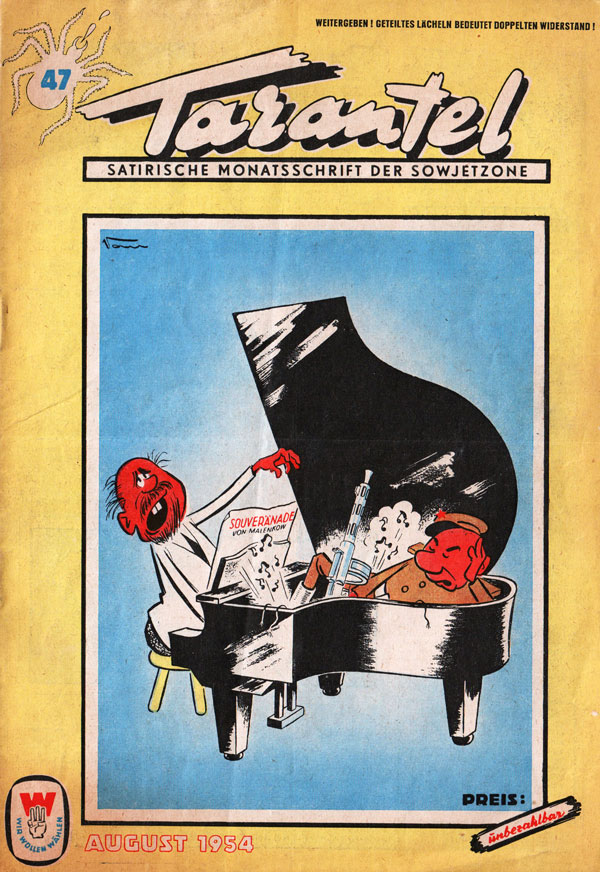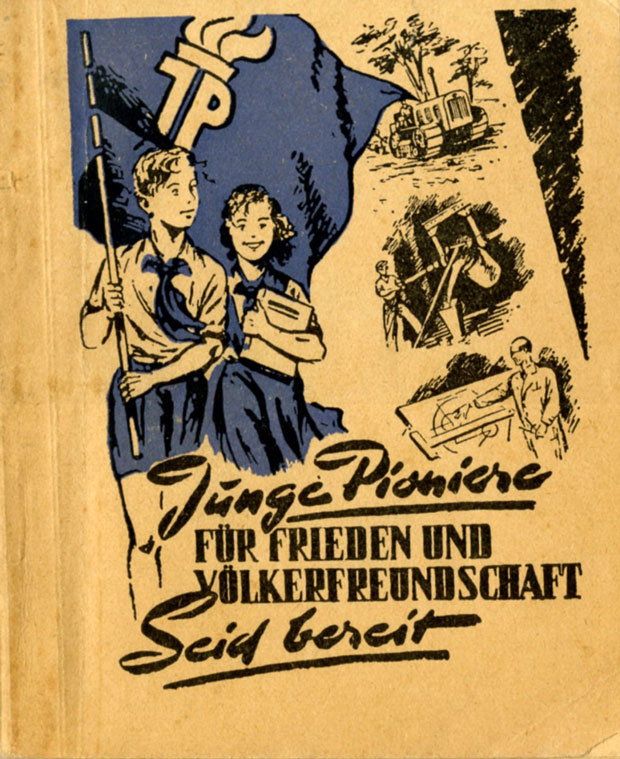'Zwiebelkorn' strip from Der Tarantel #48 (September 1954)
Gerhard Vogler was one of the cartoonists for Der Tarantel (1950-1962), a CIA-funded magazine produced in West-Berlin and distributed illegally in the DDR, mocking the establishment of the Soviet Union, the East-German Communist Party and its government officials.
Der Tarantel - background
Little is known about the man behind the signature "Vau", except that his full name was Gerhard Vogler, and that he was one of the lead cartoonists of Der Tarentel, the "satirical monthly magazine for the Soviet zone". The magazine was the initiative of the journalist Heinz Willi Wenzel (1919-1971), a former trainee at the Soviet News Bureau in Berlin-Weißensee, who had just spent three-and-a-half years in prison without a trial under under the Communist regime. Free again in 1950, he settled in West Berlin with a new mission: ridicule the East Berlin regime in the form of caricatures, jokes and satirical articles. His first target was the youth meeting of the Freie Deutsche Jugend, planned in East-Berlin in May 1950.
Assuming the pen name Heinrich Bär, Wenzel gathered a group of journalists and caricaturists, with whom he produced the first issue of Der Tarantel in a print run of 10,000 copies. As smuggling the initial A4-formatted magazines into East Berlin proved difficult, Der Tarantel switched to a smaller format. Sponsored by the American intelligence organization CIA, the magazine became a monthly, produced in West Berlin by the Freiheitsverlag Leipzig, and then distributed illegally in the Soviet-controlled East in a print run rising up to 300,000 issues.
Cover drawings by Vau for the January and August 1954 issues of Der Tarantel.
Der Tarantel denounced the hollowness of SED propaganda, took aim at the shortage of supplies and predicted an imminent end to the DDR. Their most popular targets were Josef Stalin and East German leader Walter Ulbricht. Although the magazine's name was chosen because it was to have the effect of a tarantula's sting, in truth editor Wenzel urged his co-workers to keep their cartoons and jokes simple. Staying away from too much irony or intellectualism made the title accessible to a large audience, was his reasoning. Cartoonist Gerhard Vogler however once commented that "The texts were extremely stupid - actually impossible". Still, possession and distribution of Der Tarantel in the DDR could lead to arrest by the Stasi because of the anti-Communist content. By the early 1960s, it had become clear that the Berlin Wall wasn't coming down soon, and the Americans pulled back their funding. The final issue of Der Tarantel appeared in 1962.
From: Der Tarantel #40 (January 1954).
Cartoonists
Of all the cartoonists working for Der Tarantel, Gerhard Vogler seems to have been the most productive. Using the pen name "Vau", he provided a great many cover illustrations, as well as interior cartoons and comic strips. He was also the creator of the magazine's only comic strip with a title and recurring character, the pantomime feature 'Zwiebelkorn'. Like Vau, most of Der Tarantel's other cartoonists and graphic artists used unrevealing pen names, such as Fax, Hai, Zwick, Pit and Tunitz. Most of them, including Vau/Vogler, have since faded into obscurity, but some contributors to Der Tarantel have become prominent professional cartoonists, such as Fritz Behrendt, Chlodwig Poth and Oskar (Hans Bierbrauer).
Gerhard Vogler's signature.
Jüngle Pioniere
In 1950, Gerhard Vogler was also presented as the illustrator of 'Jüngle Pioniere seid bereit - für frieden und Völkfreundschaft'. Like Der Tarantel, the title was part of the 1950s "pamphlet war" organized by the western secret services. On the outside, the brochure seemed to be a publication for the Communist youth movement of the DDR publisher Neues Leben, but on the inside, the booklet offered an abridged version of George Orwell's dystopian novel '1984', of which the content had much parallels with the situation in East Germany.
Cover for the alleged Communist youth movement booklet, which hid a copy of Orwell's '1984' novel.


